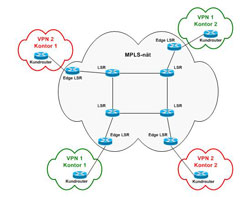The internet is often the first thing that comes to mind when considering IP wide area networks. Although it boasts near-universal accessibility and relatively low access costs, it presents significant drawbacks for business use. Factors like bandwidth, latency, jitter, and packet loss lack guarantees and predictability. Additionally, security on the internet is unreliable. However, are alternative methods for interconnecting business locations excessively expensive or difficult to manage?
 It’s feasible to establish a private IP network that enables the use of your existing IP addressing system, eliminating the need for encryption, firewalls, tunnels, or supplementary hardware. This approach offers enhanced performance compared to using VPNs over the public internet and simplifies WAN management by providing predictable network characteristics. One such provider is TelePacific, a prominent competitive carrier in the United States.
It’s feasible to establish a private IP network that enables the use of your existing IP addressing system, eliminating the need for encryption, firewalls, tunnels, or supplementary hardware. This approach offers enhanced performance compared to using VPNs over the public internet and simplifies WAN management by providing predictable network characteristics. One such provider is TelePacific, a prominent competitive carrier in the United States.
TelePacific’s 1Net is an IP VPN operating on a private MPLS network, separate from the public internet. Leveraging the versatility of Multi-Protocol Label Switching (MPLS) to transport virtually any protocol, 1Net emulates the internet while maintaining data privacy. Communication is restricted to your designated locations, preventing external entities from intercepting or viewing your data. This solution provides comprehensive connectivity within your network, with security robust enough to meet stringent regulatory requirements like HIPAA.
TelePacific implemented a similar private IP network for a healthcare organization spanning six locations. The network facilitates the secure transmission of confidential patient medical records between these locations, allowing referring physicians to access imaging results promptly on their computers. Moreover, the system streamlines claims processing, patient scheduling, and registration tasks. Another advantage is the provision of dedicated internet access through a centralized firewall at the company’s headquarters.
The TelePacific 1Net IP VPN offers both cost and performance benefits over traditional secure networking solutions such as private lines, ATM, and Frame Relay. It allows for the configuration of up to six distinct Classes of Service (CoS) to prioritize real-time services like VoIP and video conferencing. Network latency for all CoS is guaranteed at 50 milliseconds, increasing to a still-reasonable 100 milliseconds for geographically distant locations outside TelePacific’s network but within the US. Network availability is consistently high, at 99.999%, for both on-net and off-net sites.
These Classes of Service are categorized as follows: CoS 1 for real-time VoIP traffic; CoS2 for video conferencing and real-time data; CoS3 for high-priority, delay-sensitive business data such as e-commerce and Citrix; CoS4 for medium-priority, delay-sensitive business data such as CRM and WebEx; CoS5 for general, less delay-sensitive business data like ERP; and CoS6 for best-effort traffic with no prioritization, typically email and FTP.
If connecting your business locations via private lines seems prohibitively expensive and labor-intensive, or the fluctuating performance and security concerns of the internet are proving frustrating, a private IP VPN based on MPLS networking might be the optimal solution for your business needs. We encourage you to explore pricing and features to compare against your other options.
Note: MPLS network diagram courtesy of Wikimedia Commons.

